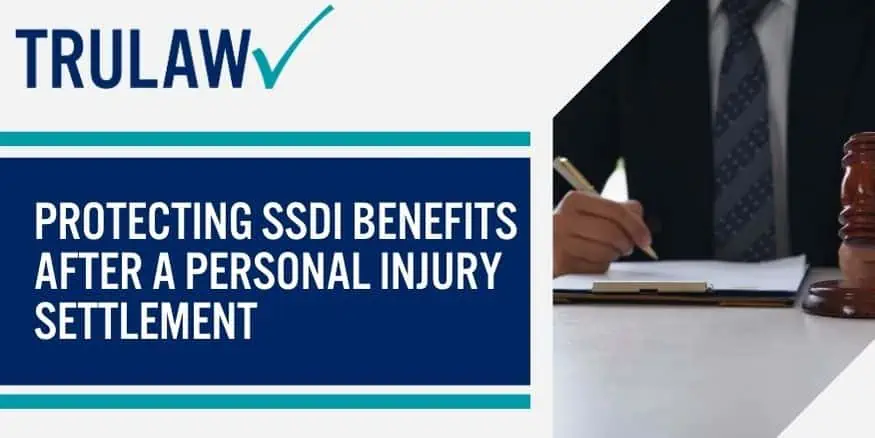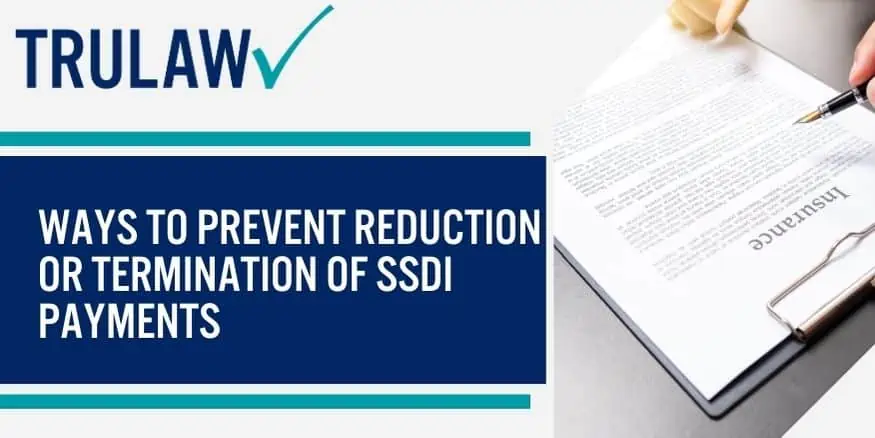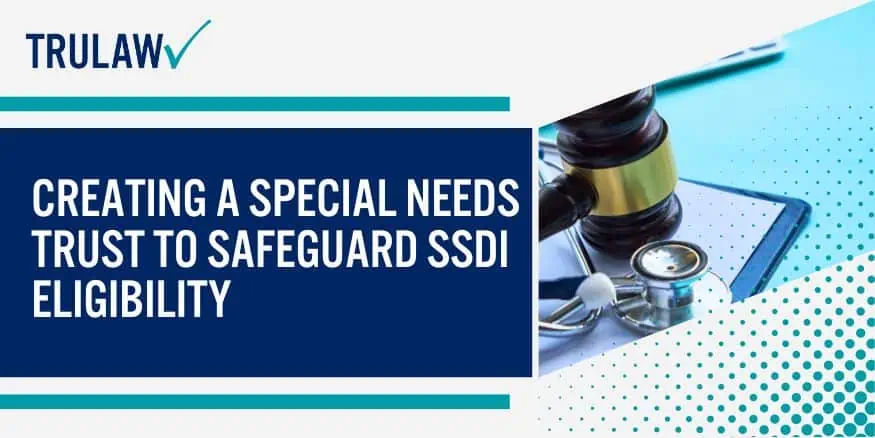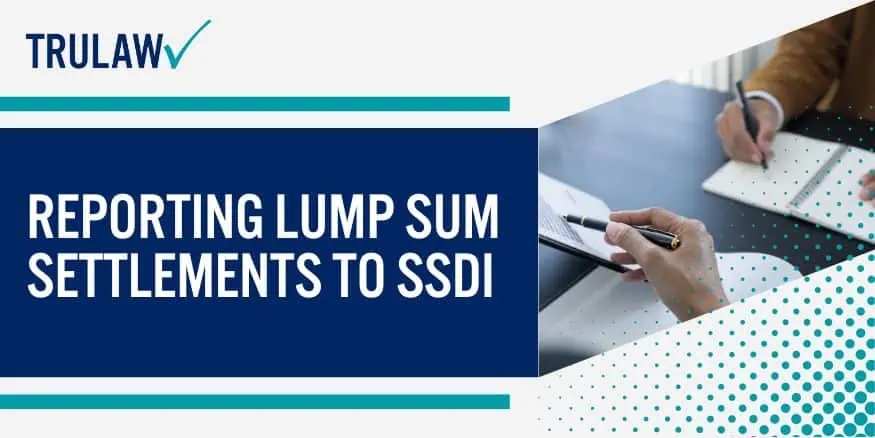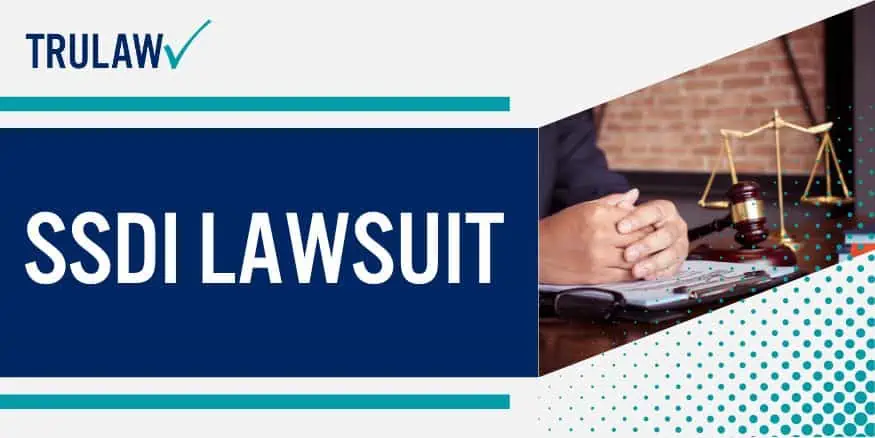SSDI Lawsuit: Impact of Personal Injury Settlement
- Last Updated: June 12th, 2025

Attorney Jessica Paluch-Hoerman, founder of TruLaw, has over 28 years of experience as a personal injury and mass tort attorney, and previously worked as an international tax attorney at Deloitte. Jessie collaborates with attorneys nationwide — enabling her to share reliable, up-to-date legal information with our readers.
Legally Reviewed
This article has been written and reviewed for legal accuracy and clarity by the team of writers and legal experts at TruLaw and is as accurate as possible. This content should not be taken as legal advice from an attorney. If you would like to learn more about our owner and experienced injury lawyer, Jessie Paluch, you can do so here.
Fact-Checked
TruLaw does everything possible to make sure the information in this article is up to date and accurate. If you need specific legal advice about your case, contact us by using the chat on the bottom of this page. This article should not be taken as advice from an attorney.
Key takeaways:
- The Social Security Disability Insurance (SSDI) program is designed to provide financial assistance to individuals who are unable to work due to a disability.
- One crucial aspect of appealing a denied SSDI claim is gathering strong medical evidence.
- Understanding the circumstances that may result in a reduction or termination of SSI payments is the first step towards avoiding any potential issues.
SSDI Lawsuit: Impact of Personal Injury Settlement
One crucial aspect of appealing a denied SSDI claim is gathering strong medical evidence.
This evidence plays a significant role in proving the severity of your condition and how it impacts your ability to work.
It’s important to compile all relevant medical records, test results, and doctor’s opinions to support your appeal of the SSDI Lawsuit.
While it may be tempting to navigate the appeals process on your own, hiring an experienced disability attorney can greatly increase your chances of success.
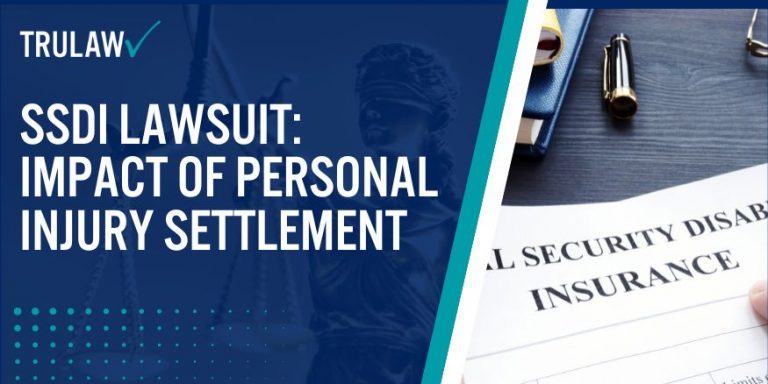
These attorneys specialize in handling SSDI cases and are familiar with the intricacies of the system.
They can guide you through the process, help you gather the necessary evidence, and present a strong case on your behalf for Social Security Disability benefits.
Time is of the essence when it comes to appealing a denied SSDI claim.
It’s crucial to understand the time limits for filing an appeal after receiving a denial.
Missing deadlines can result in missed opportunities, so it’s important to act promptly.
Table of Contents
Introduction to SSDI Lawsuit
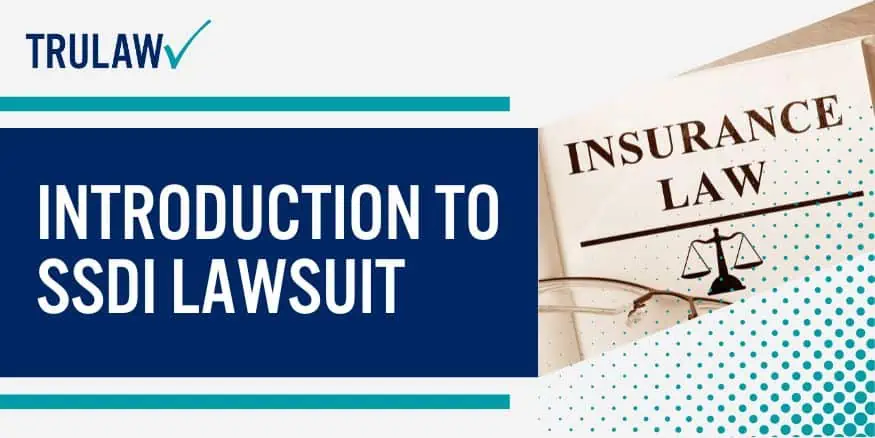
The Social Security Disability Insurance (SSDI) program is designed to provide financial assistance.
This is for individuals who are unable to work due to a disability for injury settlement effect.
This program offers monthly payments, known as SSDI payments, to eligible individuals, helping them meet their basic needs and maintain a decent quality of life.
However, there are instances where individuals may need to file an SSDI lawsuit in order to secure in receiving SSDI benefits they rightfully deserve disability claim.
An overview of the Social Security Disability Insurance (SSDI) program
SSDI is a federal program administered by the Social Security Administration (SSA).
It provides financial support to disabled individuals who have paid into the Social Security system through their employment taxes.
To qualify for SSDI benefits, applicants must meet certain eligibility criteria.
These criteria include having a severe medical condition that prevents them from engaging in substantial gainful activity.
Having accumulated enough work credits through prior employment for personal injury compensation.
Understanding the eligibility criteria for filing an SSDI lawsuit
While many individuals initially apply for SSDI benefits through the standard application process, there are cases where their claims are denied.
In such situations, applicants have the option to file an appeal or pursue an SSDI lawsuit.
To be eligible for filing a lawsuit, claimants must have completed all stages of the appeals process without success.
Exploring common reasons why individuals file SSDI lawsuits
There are various reasons why individuals choose to pursue an SSDI lawsuit instead of continuing with the appeals process.
One common reason is that they believe their initial denial was unjustified and want a fair review of their case in court.
Others may feel that they were not given proper consideration during previous stages of the appeals process and hope that presenting their case before a judge will yield more favorable results.
Some claimants may opt for a Social Security disability lawsuit if they face financial hardships due to prolonged delays in receiving benefits.
Protecting SSDI Benefits after a Personal Injury Settlement
Understanding how personal injury settlements can impact SSDI benefits
When you receive a personal injury settlement, it’s important to understand how it may affect your Social Security Disability Insurance (SSDI) benefits.
While the compensation you receive from a settlement can provide financial relief, it can also have implications for your ongoing SSDI payments.
One key factor to consider is that SSDI benefits are based on your income and resources.
If your personal injury settlement significantly increases your income or assets.
It could potentially impact your eligibility for SSDI benefits. It’s crucial to be aware of the potential consequences and take steps to protect your benefits.
Exploring strategies to protect your ongoing SSDI payments after a settlement
Fortunately, there are strategies you can explore to safeguard your SSDI benefits while still benefiting from a personal injury settlement.
Here are some options worth considering:
- Structured settlements: Instead of receiving a lump sum payment, you may opt for structured settlements.
- Special needs trusts: Setting up a special needs trust is another effective way to protect both your personal injury settlement money and social security benefits.
Consider options such as structured settlements or special needs trusts to safeguard benefits.
By choosing either a structured settlement or establishing a special needs trust, you can help safeguard both your SSDI and lawsuit settlements and future SSDI benefits.
These options provide financial security while ensuring that you remain eligible for the vital support provided by the government.
Ways to Prevent Reduction or Termination of SSDI Payments
Understanding common reasons why SSDI payments may be reduced or terminated
It’s important to understand the common reasons why these payments may be reduced or even terminated.
By being aware of these factors, individuals can take proactive steps to prevent any adverse effects on their benefits.
One key factor that can lead to a reduction or termination of SSDI payments is failing to comply with continuing disability reviews.
The Social Security Administration periodically reviews recipients’ medical conditions and disabilities to ensure they still meet the eligibility criteria.
To prevent any issues, it is crucial for beneficiaries to respond promptly and provide updated medical documentation during these reviews.
Complying with continuing disability reviews and providing updated medical documentation
Continuing disability reviews are conducted by the Social Security Administration to assess whether individuals still qualify for SSDI benefits based on their disabling condition.
Failing to comply with these reviews can result in a loss of benefits.
Therefore, it is essential for recipients to stay informed about when their review is due and promptly submit any requested information.
During these reviews, individuals must provide updated medical documentation that supports their ongoing disability.
This includes obtaining statements from healthcare professionals detailing the nature of their condition, its impact on daily activities, and any treatments or therapies received.
By ensuring all relevant medical records are up-to-date and readily available, beneficiaries can increase their chances of maintaining uninterrupted SSDI payments.
If you want to learn more about SSDI Lawsuit, contact us!
Avoiding engaging in substantial gainful activity that could jeopardize eligibility
Engaging in substantial gainful activity (SGA) refers to earning income above a certain threshold while receiving SSDI benefits.
If an individual exceeds this limit, it could potentially jeopardize their eligibility for continued payments.
To avoid such complications, beneficiaries should carefully monitor their income levels and ensure they remain within the SGA limits set by the Social Security Administration.
Filing for Social Security Disability Insurance (SSDI) after a Personal Injury
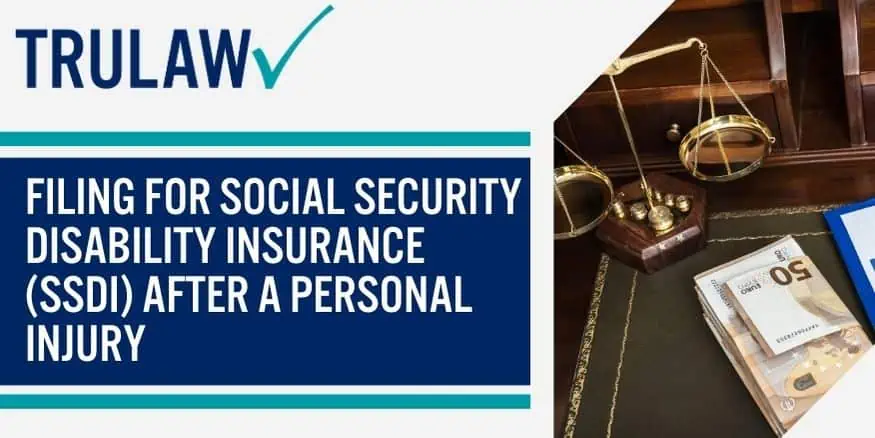
Applying for Social Security Disability Insurance (SSDI) benefits following a personal injury can be a complex and overwhelming process.
However, understanding the steps involved and seeking guidance from disability attorneys, if necessary, can help streamline the application process and increase your chances of receiving the benefits you deserve.
Exploring the Process of Applying for SSDI Benefits Following a Personal Injury
It is crucial to gather all the necessary medical evidence and supporting documentation to strengthen your case.
This includes medical records, doctor’s reports, diagnostic test results, and any other relevant documents that demonstrate the severity of your condition.
To ensure you have a strong application, consider consulting with an SSDI attorney who specializes in personal injury cases.
These professionals can guide you through the process and help you navigate any challenges that may arise along the way.
Gathering Necessary Medical Evidence and Supporting Documentation
One of the key factors in determining eligibility for SSDI benefits is providing substantial medical evidence that proves your disability prevents you from engaging in substantial gainful activity.
This evidence should clearly illustrate how your personal injury has impacted your ability to work.
In addition to medical records, it is essential to include any documentation related to ongoing treatment plans or therapy sessions.
These details help establish a comprehensive picture of your condition and its long-term effects on your daily life.
Understanding How Personal Injury Settlements May Affect Future Benefit Amounts
If you are pursuing a personal injury claim or lawsuit alongside applying for SSDI benefits, it is important to understand how any potential settlement or award may impact your future benefit amounts.
The Social Security Administration (SSA) takes into account other sources of income when calculating benefit payments.
Avoiding Reduction or Termination of SSI Payments
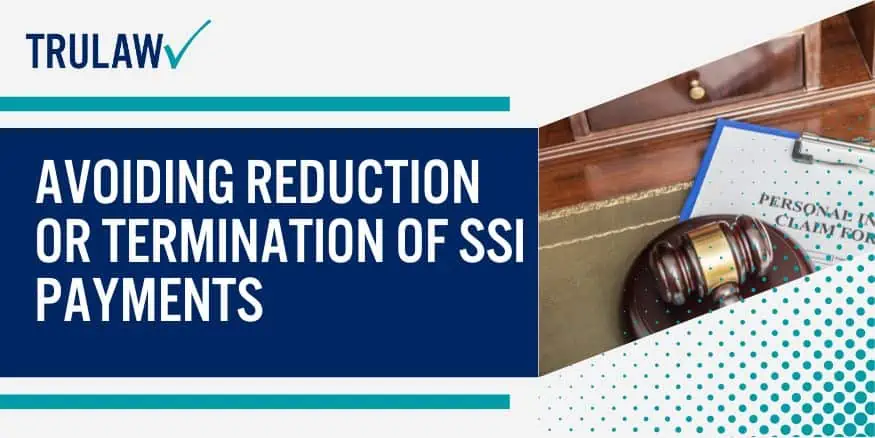
Maintaining Supplemental Security Income (SSI) payments is crucial for individuals who rely on this financial assistance.
However, there are certain factors that can lead to a reduction or termination of these payments.
To ensure continued eligibility and avoid any interruptions, it is essential to be aware of these factors and take the necessary steps to comply with the requirements.
Recognizing factors that can lead to reduction or termination of Supplemental Security Income (SSI) payments
Understanding the circumstances that may result in a reduction or termination of SSI payments is the first step toward avoiding any potential issues.
The Social Security Administration (SSA) closely evaluates income and resources when determining eligibility for SSI benefits.
Failure to meet the income and resource limits established by the SSA could lead to a reduction or complete loss of SSI payments.
If you want to learn more about SSDI Lawsuit, contact us!
Complying with income and resource limits to maintain SSI eligibility
To maintain eligibility for SSI benefits, it is crucial to comply with the income and resource limits set by the SSA.
These limits vary depending on individual circumstances, such as marital status and living arrangements.
It is important to understand what counts as income under SSA guidelines, which includes not only wages but also compensation from government programs, workers’ compensation, and other sources.
Reporting changes in circumstances promptly to avoid potential overpayments
Promptly reporting any changes in circumstances that might impact your eligibility for SSI payments is crucial.
This includes changes related to employment status, wages earned, living arrangements, marital status, or any other relevant factors.
Creating a Special Needs Trust to Safeguard SSDI Eligibility
Understanding the purpose and benefits of a special needs trust for SSDI recipients
A special needs trust is a legal arrangement designed to protect the financial well-being of disabled individuals who receive Supplemental Security Income (SSI) or Social Security Disability Insurance (SSDI).
The primary purpose of this trust is to ensure that these individuals can maintain their eligibility for government benefits while still having access to additional funds for their specific needs.
Exploring the requirements and restrictions associated with establishing a trust
Creating a special needs trust involves adhering to certain requirements and understanding its limitations with SSDI Lawsuit.
To establish such a trust, it is advisable to consult with an attorney experienced in this area of law.
They can guide you through the process and ensure compliance with all legal obligations.
Some key points related to creating a special needs trust include:
- Selecting an appropriate trustee: It is crucial to choose someone reliable and trustworthy who will manage the funds in accordance with your wishes.
- Determining funding sources: You need to identify assets that can be placed into the trust without affecting your SSDI eligibility.
- Complying with regulations: There are specific rules governing how funds from the trust can be used.
Generally, they must be used for supplemental purposes that enhance your quality of life beyond what government benefits provide.
Ensuring SSDI Stability After a Personal Injury Settlement
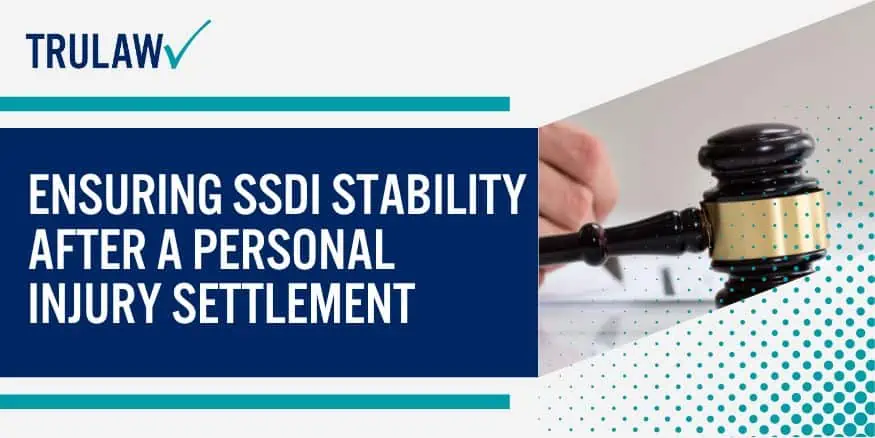
Receiving a personal injury settlement can provide much-needed financial relief for individuals who are unable to work due to their disabilities.
However, it’s important to understand the potential impact that reporting this settlement to Social Security can have on ongoing SSDI payments.
To ensure long-term stability and protect your benefits, there are several steps you can take.
Reporting the Settlement Agreement
When you receive a personal injury settlement, it is crucial to report it accurately and promptly to the Social Security Administration (SSA).
Failure to do so could result in overpayments or even legal consequences.
By informing the SSA about your settlement agreement, you allow them to adjust your benefits accordingly.
If you want to learn more about how to file a lawsuit against social security disability, contact us!
Understanding the Impact on Benefits
Reporting your personal injury settlement may affect your SSDI payments.
The SSA will consider the amount of the settlement and how it impacts your ability to meet their definition of disability.
If the settlement exceeds a certain threshold, they may reduce or suspend your benefits until the funds are depleted.
Structured Settlements and Annuities for Long-Term Stability
One option worth considering after receiving a personal injury settlement is structuring it as periodic payments rather than receiving a lump sum.
This approach allows you to create a stable income stream that won’t jeopardize your SSDI benefits.
Structured settlements involve establishing an arrangement where part of your settlement funds are paid out periodically over time.
These structured payments can align with your ongoing monthly expenses, providing financial stability without triggering reductions in SSDI Lawsuit benefits.
Reporting Lump Sum Settlements to SSDI
Understanding the requirement of reporting lump sum settlements to Social Security
It is important to understand the requirements for reporting it to the Social Security Administration (SSA).
Failure to report this settlement accurately and in a timely manner could lead to penalties or overpayments.
To ensure compliance with SSA regulations, individuals must have a clear understanding of what needs to be reported.
Knowing the specific information that needs to be reported accurately
Reporting a lump sum settlement involves providing detailed information about the settlement amount received.
It is crucial to accurately report this information as any discrepancies can result in unnecessary complications.
The SSA requires individuals receiving Social Security Disability Insurance (SSDI) benefits to report any changes in income or resources, including lump sum settlements.
If you want to learn more about how the Social Security disability lawsuit works, contact us!
Complying with reporting deadlines and procedures set by Social Security Administration
To avoid penalties or overpayments, individuals must comply with the reporting deadlines and procedures set by the SSA.
Typically, recipients have 10 days from the end of each month to report changes in their income or resources.
It is essential to submit accurate and timely reports through appropriate channels, such as online portals or by contacting your local SSA office.
Avoiding penalties or overpayments by providing accurate information
Providing accurate information regarding your lump sum settlement is vital for avoiding penalties or overpayments.
Inaccurate reporting may result in an improper calculation of benefits, leading to financial consequences down the line.
By ensuring all necessary details are included in your report, you can help prevent potential issues and maintain your SSDI benefits.
SSDI Lawsuit
If you find yourself in a situation where you need to file a Social Security Disability Insurance lawsuit, it’s important to understand the process and what to expect.
Navigating the legal system can be overwhelming, but with the right knowledge and guidance, you can increase your chances of a successful outcome.
Here are some key points to consider when it comes to an SSDI lawsuit:
Eligibility for SSDI Benefits
Before diving into the SSDI Lawsuit itself, it’s crucial to determine if you meet the eligibility criteria for SSDI benefits.
To qualify, you must have worked long enough and recently enough to earn sufficient credits through Social Security taxes.
Seeking Legal Representation
When dealing with an SSDI lawsuit, having an experienced attorney by your side can significantly improve your chances of success.
A skilled lawyer who specializes in disability law will understand the complexities involved and guide you through each step of the process.
Filing an Appeal
In some cases, individuals may need to file an appeal after their initial application for SSDI benefits is denied.
The appeals process typically involves several stages, starting with reconsideration and potentially progressing to a hearing before an administrative law judge (ALJ).
It’s essential to follow all deadlines and provide any additional evidence or documentation requested during this stage.
Building Strong Medical Evidence
One critical aspect of winning an SSDI lawsuit is presenting strong medical evidence that supports your claim.
This evidence should clearly demonstrate how your disability affects your ability to work and perform daily activities.
Conclusion: Key Takeaways from the SSDI Lawsuit Process
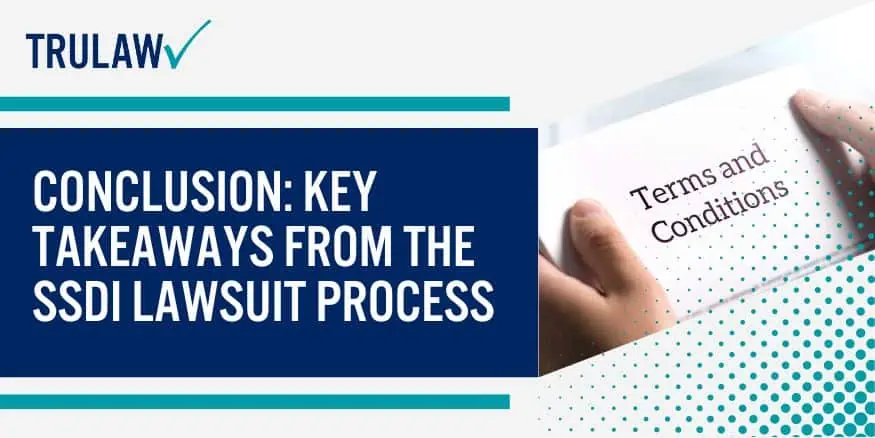
Now that you have a comprehensive understanding of the SSDI lawsuit process, you are better equipped to protect your benefits.
Remember, if you have been injured and are considering a personal injury settlement, it is crucial to take steps to safeguard your SSDI eligibility.
This can include creating a special needs trust and reporting any lump sum settlements to SSDI.
To ensure the stability of your SSDI benefits after a personal injury settlement, consult with an experienced SSDI lawyer who specializes in disability law.
SSDI Lawsuit can guide you through the process, help you understand your rights, and provide valuable advice tailored to your unique situation.
Taking proactive measures now can save you from potential complications down the road.
Social Security Disability Insurance Frequently Asked Questions
-
Yes, it is possible to file for SSDI Lawsuit after a personal injury.
However, it’s important to meet specific eligibility criteria set by the Social Security Administration (SSA).
You must have worked long enough and recently enough and have a qualifying disability that prevents you from engaging in substantial gainful activity.
-
If your SSDI payments are reduced or terminated, it is crucial to take immediate action.
Contact the SSA as soon as possible to understand why this has happened.
You may need to gather additional medical evidence or appeal their decision.
Consulting with an attorney specializing in disability law can also be beneficial during this process.
-
To protect your SSDI benefits after receiving a personal injury settlement, consider creating a special needs trust.
This legal arrangement allows you to set aside funds while still maintaining eligibility for government assistance programs such as SSDI.
-
Yes, it is essential to report any lump sum settlement you receive to SSDI.
Failure to do so can result in penalties or even the loss of your benefits.
By reporting the settlement promptly, you ensure that your eligibility for SSDI is accurately assessed and avoid potential complications.
-
To prevent a reduction or termination of your Supplemental Security Income (SSI) payments, it’s important to report any changes in your financial situation promptly.
This includes changes in income, resources, living arrangements, or marital status.
Failure to report these changes may result in an overpayment that will need to be repaid.

Managing Attorney & Owner
With over 25 years of legal experience, Jessica Paluch-Hoerman is an Illinois lawyer, a CPA, and a mother of three. She spent the first decade of her career working as an international tax attorney at Deloitte.
In 2009, Jessie co-founded her own law firm with her husband – which has scaled to over 30 employees since its conception.
In 2016, Jessie founded TruLaw, which allows her to collaborate with attorneys and legal experts across the United States on a daily basis. This hypervaluable network of experts is what enables her to share the most reliable, accurate, and up-to-date legal information with our readers!
Additional Social Security Disability Insurance resources on our website:
Here, at TruLaw, we’re committed to helping victims get the justice they deserve.
Alongside our partner law firms, we have successfully collected over $3 Billion in verdicts and settlements on behalf of injured individuals.
Would you like our help?
At TruLaw, we fiercely combat corporations that endanger individuals’ well-being. If you’ve suffered injuries and believe these well-funded entities should be held accountable, we’re here for you.
With TruLaw, you gain access to successful and seasoned lawyers who maximize your chances of success. Our lawyers invest in you—they do not receive a dime until your lawsuit reaches a successful resolution!
AFFF Lawsuit claims are being filed against manufacturers of aqueous film-forming foam (AFFF), commonly used in firefighting.
Claims allege that companies such as 3M, DuPont, and Tyco Fire Products failed to adequately warn users about the potential dangers of AFFF exposure — including increased risks of various cancers and diseases.
Depo Provera Lawsuit claims are being filed by individuals who allege they developed meningioma (a type of brain tumor) after receiving Depo-Provera birth control injections.
A 2024 study found that women using Depo-Provera for at least 1 year are five times more likely to develop meningioma brain tumors compared to those not using the drug.
Suboxone Tooth Decay Lawsuit claims are being filed against Indivior, the manufacturer of Suboxone, a medication used to treat opioid addiction.
Claims allege that Indivior failed to adequately warn users about the potential dangers of severe tooth decay and dental injuries associated with Suboxone’s sublingual film version.
Social Media Harm Lawsuits are being filed against social media companies for allegedly causing mental health issues in children and teens.
Claims allege that companies like Meta, Google, ByteDance, and Snap designed addictive platforms that led to anxiety, depression, and other mental health issues without adequately warning users or parents.
Transvaginal Mesh Lawsuits are being filed against manufacturers of transvaginal mesh products used to treat pelvic organ prolapse (POP) and stress urinary incontinence (SUI).
Claims allege that companies like Ethicon, C.R. Bard, and Boston Scientific failed to adequately warn about potential dangers — including erosion, pain, and infection.
Bair Hugger Warming Blanket Lawsuits involve claims against 3M — alleging their surgical warming blankets caused severe infections and complications (particularly in hip and knee replacement surgeries).
Plaintiffs claim 3M failed to warn about potential risks — despite knowing about increased risk of deep joint infections since 2011.
Baby Formula NEC Lawsuit claims are being filed against manufacturers of cow’s milk-based baby formula products.
Claims allege that companies like Abbott Laboratories (Similac) and Mead Johnson & Company (Enfamil) failed to warn about the increased risk of necrotizing enterocolitis (NEC) in premature infants.
Here, at TruLaw, we’re committed to helping victims get the justice they deserve.
Alongside our partner law firms, we have successfully collected over $3 Billion in verdicts and settlements on behalf of injured individuals.
Would you like our help?
